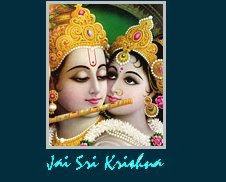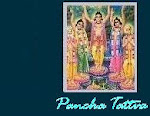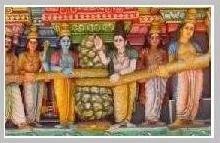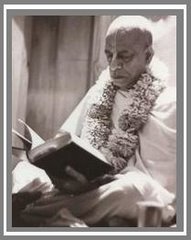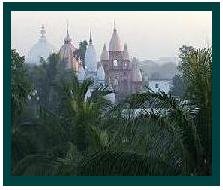Krishna is inaccessible to sensuous knowledge (16.46).
Krishna is the Lord of the infinity of worlds (69.17).
Krishna wields the power of creating the unlimited (87.28).
Krishna carries the impress of limitless power (87.14).
Krishna is possessed of inconceivable potency (10 .29).
Krishna is unborn (59.28, 74.21).
Krishna solves all heterogeneous views (74.24).
Krishna is vanquished by exclusive devotion (14.3).
Krishna is the Inner Guide (l.17)·
Krishna is the Withholder of the energy of the wicked (60.19) .
Krishna is the Giver of salvation to jivas that are free from vanity (86.48).
Krishna ordains the worldly course of conceited jivas (86.48).
Krishna is Primal God (Deva) (40.1).
Krishna is Primal Person (Purusha) (63.38).
Krishna is an overwhelming flood of bliss (83.4).
Krishna possesses fulfilled desire (47.46).
Krishna is self-delighted (60.20).
Krishna is the opponent of the sensuous (60.35).
Krishna is sung by the best of hymns (86.23).
Krishna is the dispeller of the night of pseudo-religion. (14.40).
Krishna is devoid of increase and decrease (48.26).
Krishna is efficient and material cause (10.29).
Krishna is the only Truth (14.23).
Krishna is the Awarder of the fruit of work (49.29).
Krishna is not subject to the consequences of work (84.17).
Krishna is the Seer of cause and effect (38.12).
Krishna is the Person who is time (1.7).
Krishna is Time’s Own Self (70.26).
Krishna is even the Time of time (56.27).
Krishna is Present in the heart of every animate entity, like fire inside wood (46.36)
Krishna is Grateful (48.26).
Krishna is the Augmentor (like the Full Moon) of the ocean of earth, gods, twice-born and animals (14.40).
Krishna is the Tormentor of cannibalistic persons (14.40).
Krishna is the Destroyer of the pride of the arrogant (60.19).
Krishna is the Root-Cause of the origin, etc., of the world (14.23)
Krishna is the Cause of the world (40.1).
Krishna is the Creator of the world (70.38).
Krishna is appears as if possessed of a body like that of mundane entities for the good of the world (14.55).
Krishna is the Guru (centre of gravity) of the world (80.44).
Krishna is the Refuge (Ashraya ) of jivas (individual souls) who are afraid of birth and death (49.12).
Krishna is devoid of birth (46.38).
Krishna is equally the Internal Guide, Cause and Director of jivas (87.30)
Krishna is the Destroyer of the miseries of persons who enjoy themselves in meditating upon Him (58.10).
Krishna is of the fourth dimension and self-manifest (66.38)
Krishna is Worthy of being gifted (741.24) .
Krishna is the Punisher of the wicked (69.17).
Krishna is the God of gods (80.44).
Krishna is rarely cognizable by the gods (48.27).
Krishna is unconcerned about body, house, etc. (60.20).
Krishna is the Supreme Ruler of the greatest gods (738).
Krishna is the Exponent of Religion (69.40).
Krishna is the Eternal Son of Nanda (14.1).
Krishna is Visible to man with great difficulty (71.23).
Krishna’s Presence mocks the world of man (70.40).
Krishna is the Object of palatable drink of the human eye (71.33).
Krishna is lnternal Guide of all (31.4).
Krishna is Worthy of the worship of all the worlds (69.15).
Krishna accommodates all the worlds (59.30).
Krishna is the Maniifestor of all light (63.34).
Krishna is unstinted in giving Himself away to one who recollects Him. (80.11)
Krishna is the efficient Cause (87.50).
Krishna, although devoid of all mundane quality, assumes mundane qualities by His Inconceivable Power for the purposes creation, etc. (46.40).
Krishna is not subject to change (64.29).
Krishna is not capable of discrimination, by reason of void of any extraneous covering (87.29).
Krishna is the Giver of Himself to those who covet nothing (86.33).
Krishna loves those who covet nothing (60.14).
Krishna does no work (60.20).
Krishna is the Human, Hidden, Primal Person (Purusha) (44.13).
Krishna is Present in the hearts of jivas like the five elements (82.45).
Krishna is the Supreme Sorcerer (70.37).
Krishna is Supreme Godhead and the Internal Guide of all (56.27).
Krishna is the Crest-jewel of those whose praises are sung by the sacred lore (71.30).
Krishna is Primal Person and Ever-existing (14.23).
Krishna is the Highest among the Objects of worship (74.19).
Krishna is the Healer of the miseries of the submissive (73.16).
Krishna is the Destroyer of the sins of the submissive (31.7).
Krishna is the Destroyer of the distress of the submissive (73.8).
Krishna is the Residue after the Cataclysm (87.15).
Krishna is devoid of touch with mundane senses (87.28).
Krishna is the Soul and Friend of all animate entities (29.32).
Krishna is devoid of distinction appertaining to an alien (63.38,44).
Krishna is Inconceivable by His Nature (70.38).
Krishna is the Master of the Universe (70.37).
Krishna is the Nourisher of the Unierse (85.5).
Krishna is the Sun that cheers the lotus of the kindred of the Vrishnis (14.40)
Krishna is God worshipped by the Brahmanas (69.15).
Krishna is Foremost of the Brahmanas (84.20).
Krishna is the Originator of Brahma (40.1).
Krishna is the Worshipped of Brahma (31.13).
Krishna loves His devotees (48.26).
Krishna wears Forms in accordance with the wishes of His devotees (59.25)
Krishna is etertnally Present in Mathura (1.28) .
Krishna is devoid of the. sense of kinship and regards all in the same way (46.37).
Krishna is beyond all Measuring Potency (Maya) (63.26)
Krishna is subdued by the love of Judhisthira (72.10).
Krishna is concealed by the screen of Maya from the sight of the people 84.23).
Krishna does not follow the ways of the world (60.36).
Krishna is the Destroyer of the fear of the mundane sojourn of the submissive. (85.19).
Krishna is the Womb of the Scriptures. (16.44, 80.45, 84.20).
Krishna is Sree Guru’s Own Self (80.33).
Krishna is devoid of hankering for wife, offspring, etc. (60.20).
Krishna is of the Ordainer of the worldly sojourn and of the summon bonum (1.7).
Krishna is the friend of the good (69.17).
Krishna is devoid of discrimination as of kinship (63.38, 44).
Krishna is Existence (56.27).
Krishna possesses true desires (80.44).
Krishna is the True Entity (87.17).
Krishna is True of speech (48.26).
Krishna is True of resolve (37.12).
Krishna sees with an equal Eye (16.33).
Krishna is the Cause of all causes (14.56-57, 63.38, 87.16).
Krishna is the Originator of all (59.28).
Krishna is the Soul’s own self of all jivas (individual souls) (14.55).
Krishna is Omniscient (16.48).
Krishna is All-seeing (38.18).
Krishna is the Embodiment of all gods (74.19, 86.54).
Krishna is the Seer of all (16.48).
Krishna is the Lord of all (37.23).
Krishna is the Stay (Ashraya) of all entities (82.46).
Krishna is All-pervasive and Eternal (9.13).
Krishna is the Soul of all elements (86.31).
Krishna is the Knower of the minds of all elements (81.1).
Krishna is the soul’s self of all elements (74.24).
Krishna is the lnner Soul of all elements (37.11).
Krishna is the Internal Guide of all elements (47.29)
Krishna is the Cause of the origin of all elements (64.29).
Krishna is the Limit of all good (84.21).
Krishna is Omnipotent (37.12).
Krishna is the Lord of Lakshmi, the Presiding Deity of all riches (47.46).
Krishna is the Internal Guide of all (63138, 7216).
Krishna is the Stay (Ashraya) of all (40.15).
Krishna is Witness and Seer of Self (86.31).
Krishna is the Refuge of the good (80.9).
Krishna is most difficult to serve (88.11).
Krishna is the Friend of one’s heart (48.26).
Krishna is the Withholder of Creation (82.45).
Krishna is Withholder, Creator and Preserver (63.44).
Master of the functions of creation, etc. (16.49, 37.12).
Krishna is devoid of distinction as of kinship (74.21).
Krishna is devoid of distinction as between kin and alien (72.6).
Krishna indwells the Universe created by Himself (48.19).
Krishna is satisfied by the taste of His Self-Delight (72.6).
Krishna is the Destroyer of the worldly sojourn of His devotees (60.43).
Krishna is the Wearer of body according to His Wish (1.7).
SIDDHANTA SARASWATI.
24th Nov., 1932.
Sree Krishna-Chaitanya Math
Brindaban, Muttra
Note: Srila Bhaktisiddhanta advised his students to preach the movement of Sri Caitanya Mahaprabhu to the English speaking world. "Krishna is" was to be used as a guideline in that preaching work. Our Srila Prabhupad ( A.C Bhaktivedanta Swami ) inculded all the above in his wonderful presentation of his summery study of the 10th Canto titled "KRSNA the Supreme Personality of Godhead". -AJD

































